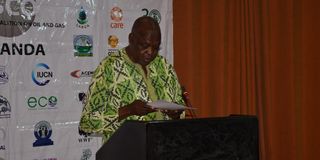Prime
Fear of oil curse dominates parliamentary symposium

State Minister for Minerals Peter Lokeris reads his speech during the parliamentary symposium on the petroleum sector in Kampala yesterday. PHOTO/ FRANKLIN DRAKU
What you need to know:
Experts have asked legislators to use their oversight roles to ensure that right laws are enacted and implemented.
As Uganda prepares for oil production in the next three years, different stakeholders in the oil and gas sector have cautioned the government against the so-called oil curse.
Attending a parliamentary symposium on the petroleum sector yesterday, Members of Parliament and other experts called for safeguards against poverty for communities living around the Albertine Graben.
The conference was organised by Advocates Coalition for Development and Environment (Acode), Civil Society Coalition on Oil and Gas (CSCO) and the Parliamentary Forum on Oil and Gas.
Uganda has 6.5 billion barrels of crude oil, with 1.4 billion barrels recoverable.
Mr Michael Mawanda, the vice chairperson of the Parliamentary Forum on Oil and Gas, said while the sector has the potential to bolster prospects in Uganda, clear and present dangers remain.
“We must make sure the extraction of the oil and gas does not negatively affect the people from areas where the minerals are mined,” Mr Mawanda said, adding: “It is the responsibility of the government to ensure that it does the right thing.”
Mr Onesmus Mugenyi, the deputy executive director of Acode, said: “Many countries with oil and gas have had many challenges and the revenues accrued from these ventures do not benefit the communities. Look at fish and tourism, when their values go up, it doesn’t benefit the communities near game parks and the fishing communities.”
Mr Mugenyi noted that failure to implement laws and policies is working to the detriment of Ugandans.
He tasked the legislators to use their oversight roles to ensure that right laws are enacted and implemented.
Mr David Duli, the country director of World Wide Fund for Nature, suggested that oil activities in ecologically sensitive areas proceed cautiously
“When you go back you must double your efforts to ensure that the people from the regions where these deposits are extracted really benefit. We must tighten the loose ends,” he told the legislators.
Mr Duli also tasked the National Environment Management Authority to make sure all the environmental impact assessment reports are made public so that those who are supposed to monitor know the implications of such activities.
MP Theodore Ssekikubo, the chairperson of the parliamentary forum on oil and gas, wondered why the government focuses more on the crude oil pipeline instead of the oil refinery that would spur industrialisation.
“Our focus should have been on the refinery so that we also set up associated industries like for petri-chemicals, fertilisers and others,” he said.
He also said instead of constructing the oil pipeline, the government should have constructed the Standard Gauge Railway (SGR) to transport that crude oil, arguing that while “oil is finite…the SGR remains for the country.”
In response, Mr Peter Lokeris, the State minister for minerals, said while the initial focus was for construction of a refinery; oil companies preferred a pipeline to export the crude oil out of the country. He said after protracted negotiations, they reached a compromise.
“We had to strike a balance with the oil companies so that we have a refinery here to serve the country and the region and then export others so that they can recover their expenses,” he said.
He added that sustainable utilisation of natural resources requires a human-centred approach.
Mr Lokeris revealed that the conclusion of the agreements for the East African Crude Oil Pipeline
(EACOP) has led to the resumption of development activities in the Tilenga Development Area.
“Therefore, there is now need for effective monitoring and regulation of these petroleum activities including compliance requirements for local content. For the key institutions to ably perform their obligations, it is important that they are adequately funded in terms of development and operational budgets,” he said.
The junior minerals minister also asked the legislators to support proposed amendments that will soon be tabled in parliament. The bills, which were recently approved by Cabinet, include the East African Crude Oil Pipeline (EACOP) Bill, 2021; the Income Tax Amendment Bill, 2021; and the Public Finance Management Amendment Bill, 2021.


